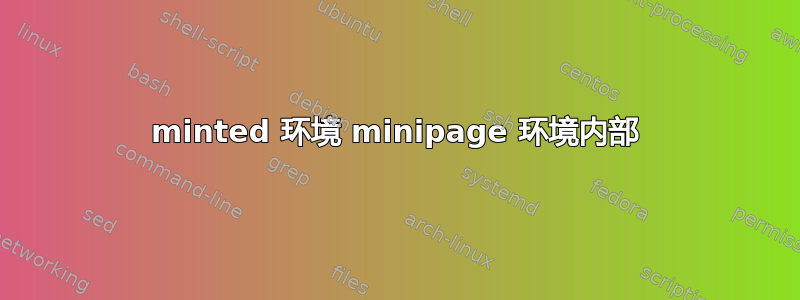
我在文档中经常需要minted在环境中使用环境。我想编写一个新的环境来执行此操作,但由于它不设计为包含在其他环境中,因此我决定使用编写一个小补丁,基于
minipagemintedminted internals使用 minted 定义新环境我将这个补丁包含到我的主要文档中。但是,它似乎仍然不起作用。
错误信息:
Paragraph ended before \FV@BeginScanning was complete \begin{cppcode}[10.7cm]
有人能帮我找出我做错什么了吗?
这是“补丁”的代码。它重新定义了\newminted快捷方式命令以将minipage环境合并到自定义minted环境中,并使用几个嵌套条件来检查是否minipage提供了可选宽度。
\makeatletter
\DeclareDocumentCommand \newminted {o m m}
{
\IfNoValueTF {#1} % check if custom env. name is provided, and create new env. accordingly
{\def\minted@envname{#2code}}
{\def\minted@envname{#1}}
\DeclareDocumentEnvironment {\minted@envname} {o} % default env.
{ % begin definition
\IfNoValueTF {##1}
{ % minipage width not provided
\VerbatimEnvironment\begin{minted}[#3]{#2}
}
{ % minipage width provided
\VerbatimEnvironment
\minted@resetoptions
\setkeys{minted@opt}{#3}
\centering
\begin{minipage}{##1}
\begin{VerbatimOut}{\jobname.pyg}
}
}
{ % end definition
\IfNoValueTF {##1}
{ % minipage width not provided
\end{minted}
}
{ % minipage width provided
\end{VerbatimOut}
\minted@pygmentize{#2}
\DeleteFile{\jobname.pyg}
\end{minipage}
}
}
\DeclareDocumentEnvironment {\minted@envname *} {m o} % custom env. name
{ % begin definition
\IfNoValueTF {##2}
{ % minipage width not provided
\VerbatimEnvironment\begin{minted}[#3,##1]{#2}
}
{ % minipage width provided
\VerbatimEnvironment
\minted@resetoptions
\setkeys{minted@opt}{#3,##1}
\centering
\begin{minipage}{##2}
\begin{VerbatimOut}{\jobname.pyg}
}
}
{ % end definition
\IfNoValueTF {##2}
{ % minipage width not provided
\end{minted}
}
{ % minipage width provided
\end{VerbatimOut}
\minted@pygmentize{#2}
\DeleteFile{\jobname.pyg}
\end{minipage}
}
}
}
\makeatother
以下是使用上述代码的 MWE:
\documentclass[10pt]{article}
\usepackage{xparse}
% Page layout
\usepackage[landscape,margin=0.5in]{geometry}
\usepackage{multicol}
% Code
\usepackage{minted}
\definecolor{col}{HTML}{F5EAB5}
\input{minted_patch2.tex} % CONTAINS THE PATCHED CODE
\usemintedstyle{trac}
\newminted{cpp}{bgcolor=col, linenos=true}
\newcommand{\keyw}[1]{\texttt{\textbf{#1}}}
\title{}
\author{}
\date{}
\begin{document}
\begin{multicols}{2}
\maketitle
\section{Primitive Built-in Types}
\subsection{Literals}
Every literal has a type determined by its \textit{form} and \textit{value}
\subsubsection{Integer \& Floating Point Literals}
Integer literals can be represented using \textbf{decimal}, \textbf{octal}, or \textbf{hexadecimal} notations. Integer
literals that begin with \texttt{0} (zero) are interpreted as octal. Those that begin with either
\texttt{0x} or \texttt{0X} are interpreted as hexadecimal:
% Minipage width specified. NO on-the-fly options
\begin{cppcode}[10.7cm]
20 /* decimal */ 024 /* octal */ 0x14 /* hexadecimal */
\end{cppcode}
By default, decimal literals are signed. whereas octal and hexadecimal literals can either be signed or unsigned. Decimal literal has the smallest type of \keyw{int}, \keyw{long}, or \keyw{long long} in which the value fits. Octal and hexadecimal literals have the smallest type of \keyw{int}, \keyw{unsigned int}, \keyw{long}, \keyw{unsigned long}, \keyw{long long}, or \keyw{unsinged long long}
Floating-point literals include either a decimal point or an exponent specified using scientific notation. Using scientific notation, the exponent is indicated by either E or e:
% Minipage width specified. WITH on-the-fly options
\begin{cppcode*}{linenos=false}[6cm]
3.14159 3.14159E0 0. 0e0 .001
\end{cppcode*}
\end{multicols}
\end{document}
答案1
此代码可以稍微清理一下,但应该可以满足您的大部分需求。在没有强制参数的情况下,获取 verbatim 环境的可选参数总是很棘手。请参阅这以供参考。
我将您的环境重命名为,cpp这样我就不必深入研究minted内部结构,并将可选参数放在强制参数之前,这是很典型的。
\documentclass[10pt]{article}
% Page layout
\usepackage[landscape,margin=0.5in]{geometry}
\usepackage{multicol}
% Code
\usepackage{minted}
\definecolor{col}{HTML}{F5EAB5}
%\input{minted_patch2.tex} % CONTAINS THE PATCHED CODE
\usemintedstyle{trac}
\newminted{cpp}{bgcolor=col, linenos=true}
\makeatletter
\newif\ifmintedminipage
\def\getoptarg[#1]{%
\endgroup
\ifthenelse{\equal{#1}{}}%
{\mintedminipagefalse\begin{cppcode}}%
{\mintedminipagetrue
\begin{minipage}{#1}\begin{cppcode}}%
}
\newenvironment{cpp}%
{\VerbatimEnvironment
\begingroup\obeylines
\@ifnextchar[{\getoptarg}{\getoptarg[]}}%
{\end{cppcode}%
\ifmintedminipage\end{minipage}\fi
}
\newenvironment{cpp*}[2][]%
{\VerbatimEnvironment
\ifthenelse{\equal{#1}{}}%
{\mintedminipagefalse\begin{cppcode*}{#2}}%
{\mintedminipagetrue
\begin{minipage}{#1}\begin{cppcode*}{#2}}%
}%
{\end{cppcode*}%
\ifmintedminipage\end{minipage}\fi
}
\makeatother
\newcommand{\keyw}[1]{\texttt{\textbf{#1}}}
\title{}
\author{}
\date{}
\begin{document}
\begin{multicols}{2}
\maketitle
\section{Primitive Built-in Types}
\subsection{Literals}
Every literal has a type determined by its \textit{form} and \textit{value}
\subsubsection{Integer \& Floating Point Literals}
Integer literals can be represented using \textbf{decimal}, \textbf{octal}, or \textbf{hexadecimal} notations. Integer
literals that begin with \texttt{0} (zero) are interpreted as octal. Those that begin with either
\texttt{0x} or \texttt{0X} are interpreted as hexadecimal:
% Minipage width specified. NO on-the-fly options
\begin{cpp}[10cm]
20 /* decimal */ 024 /* octal */ 0x14 /* hexadecimal */
\end{cpp}
\begin{cpp}
20 /* decimal */ 024 /* octal */ 0x14 /* hexadecimal */
\end{cpp}
By default, decimal literals are signed. whereas octal and hexadecimal literals can either be signed or unsigned. Decimal literal has the smallest type of \keyw{int}, \keyw{long}, or \keyw{long long} in which the value fits. Octal and hexadecimal literals have the smallest type of \keyw{int}, \keyw{unsigned int}, \keyw{long}, \keyw{unsigned long}, \keyw{long long}, or \keyw{unsinged long long}
Floating-point literals include either a decimal point or an exponent specified using scientific notation. Using scientific notation, the exponent is indicated by either E or e:
% Minipage width specified. WITH on-the-fly options
\begin{cpp*}[10cm]{linenos=false}
3.14159 3.14159E0 0. 0e0 .001
\end{cpp*}
\begin{cpp*}{linenos=false}
3.14159 3.14159E0 0. 0e0 .001
\end{cpp*}
\end{multicols}
\end{document}


